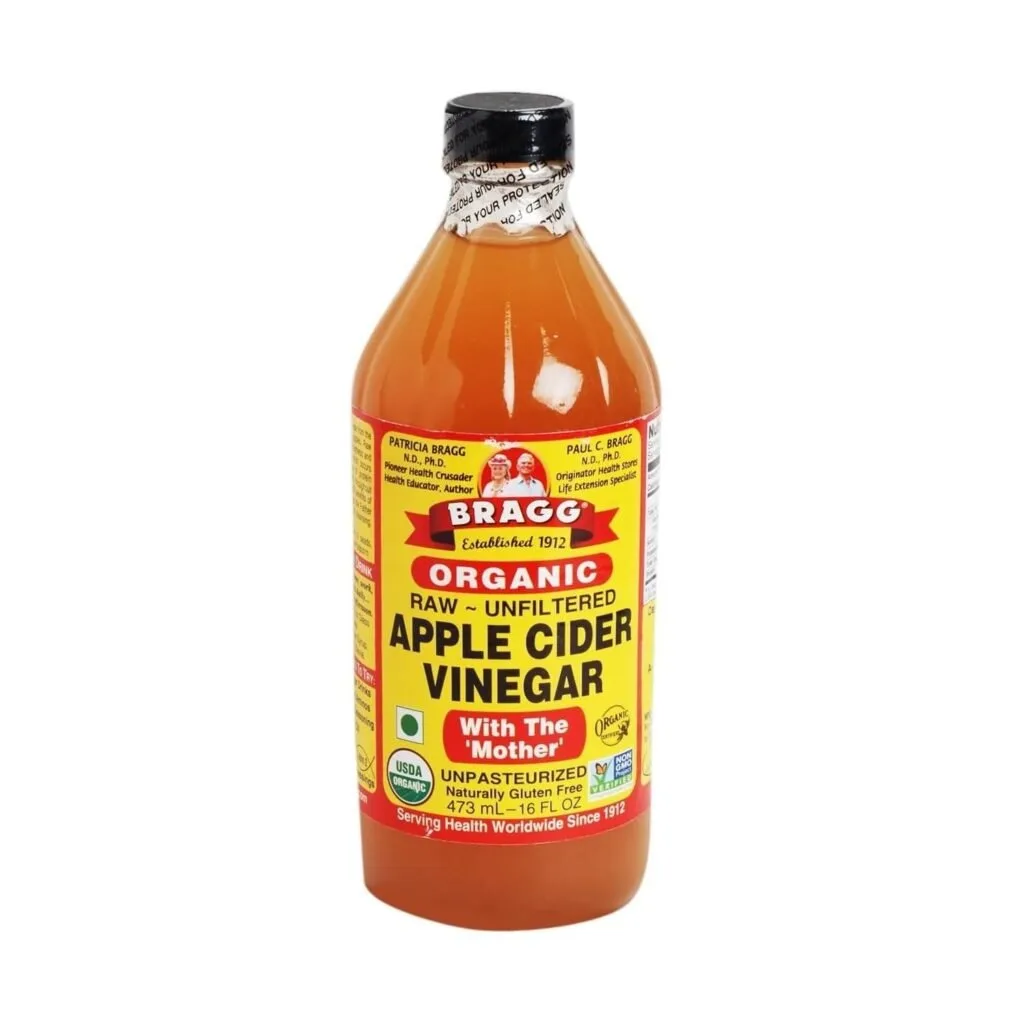Apple cider vinegar (ACV) has been around for centuries, but not all brands are created equal.
When people talk about the “real stuff,” they almost always mean Bragg Apple Cider Vinegar with the Mother.
It’s raw, unfiltered, and naturally fermented, basically the opposite of those crystal-clear supermarket versions that have been pasteurized to death.
But let’s cut to the chase: why are so many folks adding a splash of this tangy liquid to their daily routines?
Is it just hype, or does Bragg’s ACV actually have some benefits worth your time? Spoiler alert, it’s both practical and surprisingly versatile.
Let’s break it down.
What Makes Bragg Different?

Here’s the thing: you can find apple cider vinegar in almost any grocery store aisle. But Bragg is a standout because it contains “the Mother.”
That’s the cloudy, strand-like stuff floating at the bottom of the bottle. It’s made of proteins, enzymes, and beneficial bacteria that develop naturally during fermentation.
Most commercial vinegars filter this out to make the liquid look pretty, but in doing so, they strip away some of the nutritional goodness.
Bragg keeps it intact, which is why wellness enthusiasts, dietitians, and even old-school herbalists swear by it.
If you’re curious, this is the exact Bragg Organic Raw Unfiltered Apple Cider Vinegar people rave about.
1. Supports Digestion (Goodbye, Bloated Belly)
A lot of people use Bragg ACV before meals to ease digestion. The acetic acid in vinegar may help increase stomach acidity, which means your food breaks down more efficiently.
If you’ve ever felt that heavy, “why did I eat so much pasta?” kind of bloating, this is where ACV might come in handy.
Some even say a tablespoon of water 20–30 minutes before eating reduces acid reflux or heartburn.
That might sound odd, adding acid to fight acid, but for many, it works because it balances stomach pH.
Pro tip: Start slow with 1 teaspoon diluted in a full glass of water. Going straight for a shot glass? Yeah, your throat and teeth won’t thank you.
2. May Help with Blood Sugar Balance
One of the most researched perks of apple cider vinegar is its potential effect on blood sugar.
Several small studies suggest that vinegar can improve insulin sensitivity and help reduce blood sugar spikes after carb-heavy meals.
For someone managing type 2 diabetes or insulin resistance, that’s worth noting. Even for folks without diabetes, avoiding wild sugar spikes means fewer energy crashes (and maybe less temptation to grab another sugary snack an hour later).
If you’re into self-tracking, pairing Bragg’s ACV with a continuous glucose monitor (like the ones from Levels or Nutrisense) can be an interesting experiment.
3. Appetite Control & Weight Management
Let’s be real: ACV isn’t a magic weight-loss potion. But here’s where it plays a role—satiety.
Drinking ACV before meals may help you feel fuller, which could naturally reduce calorie intake.
Some small-scale studies even showed participants lost a bit more weight when vinegar was added to their routine.
Does that mean you can down pizza and soda and expect miracles? Nope. But as a supportive tool in a balanced diet, it may help curb overeating.
If you’re not a fan of the strong vinegar taste, Bragg actually makes ACV Gummies, which are a lot easier to work into daily life.
4. Skin and Hair Benefits (Yes, You Can Use It Outside the Kitchen)
Bragg’s ACV isn’t just for sipping or cooking, it’s a surprisingly handy beauty product.
- For skin: Many people dilute ACV with water and use it as a toner. It may help balance skin pH, reduce acne-causing bacteria, and calm irritation.
- For hair: A rinse of diluted ACV can remove product buildup, restore shine, and even reduce scalp itchiness. (But again dilute it. Straight vinegar can be too harsh.)
If DIY beauty experiments aren’t your thing, you can buy ACV-based shampoos and rinses already formulated for sensitive skin and hair.
5. Immune Support and Antimicrobial Properties
Vinegar has been used as a natural disinfectant for ages. The acetic acid in Bragg’s ACV has antimicrobial properties, which may help fight harmful bacteria.
While it’s not a replacement for hand sanitizer or antibiotics, it can support general wellness.
Some folks swear by a warm “ACV tea” with honey and lemon when they feel a cold coming on.
The steam, the acidity, the soothing honey, it feels comforting even if it’s just helping you hydrate and rest.
6. Heart Health Potential
Though more human research is needed, some animal studies suggest apple cider vinegar may help lower cholesterol and triglycerides.
Combined with its potential to improve blood sugar and support weight management, it might contribute to overall cardiovascular health.
Is Bragg ACV a substitute for your statins? Definitely not. But think of it as a small addition to a heart-healthy lifestyle, such as walking after meals, swapping butter for olive oil, or sprinkling chia seeds into your smoothie.
7. A Natural Cleaning Agent (Yes, Really)
This part might sound odd, but one of the coolest things about Bragg ACV is that it’s not just for your body, it can be used around the house.
A diluted mix of vinegar and water makes an effective, non-toxic cleaner. It cuts through grease, neutralizes odors, and works as a natural disinfectant.
There’s a reason so many DIY cleaning recipes call for vinegar. Just don’t use it on granite or marble, as it can etch the surface.
Real Talk: The Downsides
As much as fans love it, ACV isn’t perfect for everyone.
- It’s acidic. Drinking it straight can damage tooth enamel and irritate your throat. Always dilute it.
- It can interact with medications. Especially diuretics, insulin, and heart medications. If you’re on prescriptions, talk with your doctor before making it a daily ritual.
- Too much isn’t better. One to two tablespoons a day is plenty. More can mess with potassium levels.
Basically, moderation matters.
Fun Ways to Use Bragg’s ACV
If plain vinegar water sounds like punishment, there are other ways to make it work:
- Mix it with sparkling water and a splash of fruit juice for a DIY “healthy soda.”
- Add it to salad dressings with olive oil, mustard, and herbs.
- Stir it into soups or marinades for a tangy kick.
- Blend into smoothies (just a little) for a refreshing twist.
And if you’re busy and don’t want to measure vinegar at work, those Bragg ACV Gummies or even ACV capsules are a convenient backup.
Should You Try It?
Here’s the truth: Bragg Apple Cider Vinegar isn’t a miracle cure. But it is a versatile, affordable, and natural product with real benefits backed by at least some science.
For digestion, blood sugar balance, and general wellness, it can be worth experimenting with.
Think of it less like a magic bullet and more like a small tool in your health toolbox, right alongside your probiotics, your leafy greens, and maybe that yoga mat you swear you’ll start using again.
Final Thoughts
Bragg Apple Cider Vinegar has earned its reputation for a reason. From digestion and skin health to cooking and cleaning, it’s one of those products that proves “simple” doesn’t mean “ineffective.”
If you’ve never tried it, start small. Pick up a bottle of Bragg Organic Raw Unfiltered Apple Cider Vinegar or the more beginner-friendly ACV Gummies.
See how your body (and maybe your kitchen) responds.
Sometimes the old remedies really do deserve a permanent place in the modern pantry.

